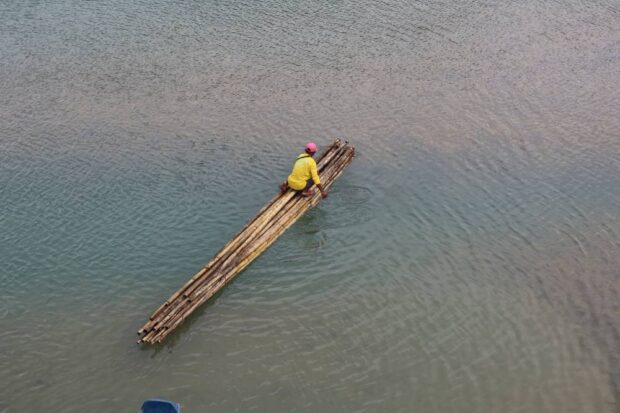Ilagan’s cleanest river off-limits to public for rehab

CLOSED FOR NOW | A fisherman uses a bamboo raft to cross Abuan River in the remote village of Bintacan in the City of Ilagan, Isabela, on Jan. 14. The river, an ecotourism spot, has been ordered closed by the Ilagan City government to visitors for rehabilitation. (Photo by VILLAMOR VISAYA JR. / Inquirer Mindanao)
CITY OF ILAGAN, Isabela, Philippines — The crowd-drawing Abuan River in the village of Bintacan in this capital city of Isabela province was closed to the public until further notice to jump-start its rehabilitation and cleanup, local authorities said on Saturday.
Once regarded by the Department of Interior and Local Government as the “cleanest river” in Cagayan Valley in the 1990s, the river has been a favorite place for villagers and tourists who do whitewater rafting, rappelling, waterfalls trekking, kayaking and other water activities, city information officer Paul Bacungan said.
The closure was prompted by reports that many people who have flocked to the area have been polluting the river with garbage and other waste.
“The river is an eco-tourism spot and the city government is working to protect it,” Bacungan added.
A part of the Northern Sierra Madre National Park, one of the remaining tropical rainforests on the island of Luzon that is rich in flora and fauna, the Abuan River is located 82 meters above sea level and is a favorite swimming place among locals and visitors.
Article continues after this advertisementMitigation plans
Decades ago, when the forested and watershed areas of the Sierra Madre mountain ranges were being decimated by illegal logging and charcoal production activities, the “cold, crystal clear” water of the Abuan River remained pure.
Article continues after this advertisementBut in recent years, deforestation due to illegal logging, poaching, and land conversion has led to the loss of ecosystem services in the Abuan watershed.
In 2018, Abuan River received from the Abuan Integrated Watershed Management Program (AIWMP) a five-year, P55-million ($1.3 million) project grant implemented by the Kabang Kalikasan ng Pilipinas Foundation Inc. in partnership with the Department of Science and Technology and local governments in Isabela.
The AIWMP has helped build the capacities of the barangays of Ilagan City to develop flood and drought risk mitigation plans in preparation for extreme weather events, city records showed.
The AIWMP implemented activities to develop climate models and build decision support tools to mitigate the impacts of climate change on agriculture and livelihood, and develop hydrologic and hydro-agronomic models to simulate flooding and dry spells, city records said.
The hydrologic models served as inputs to an early flood warning system being developed by AIWMP for flood-prone communities in the Abuan watershed.
The hydro-agronomic models will support access by farmers to weather and crop information through a Farmer Decision Support System (FDSS) developed in partnership with IBM Philippines, Isabela State University-Echague Campus, the Department of Agriculture in the Cagayan Valley region, and the University of the Philippines-Institute of Environmental Science and Meteorology under the Smarter Agriculture Program.
The FDSS provides farmers and extension workers with the latest weather and crop advisories such as optimal planting dates, fertilizer application, and water management, among others.